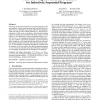228 search results - page 39 / 46 » A Theory of Restrictions for Logics and Automata |
ICFP
2005
ACM
14 years 2 months ago
2005
ACM
Narrowing-driven partial evaluation is a powerful technique for the specialization of (first-order) functional and functional logic programs. However, although it gives good resu...
ICFP
2000
ACM
14 years 29 days ago
2000
ACM
We show that standard formulations of intersection type systems are unsound in the presence of computational effects, and propose a solution similar to the value restriction for ...
FUZZIEEE
2007
IEEE
14 years 2 months ago
2007
IEEE
— One of the main obstacles facing the application of computational intelligence technologies in pattern recognition (and indeed in many other tasks) is that of dataset dimension...
HT
2005
ACM
14 years 2 months ago
2005
ACM
Hypertext can be seen as a logic representation, where semantics are encoded in both the textual nodes and the graph of links. Systems that have a very formal representation of th...
MLQ
2007
13 years 8 months ago
2007
We define two notions for intuitionistic predicate logic: that of a submodel of a Kripke model, and that of a universal sentence. We then prove a corresponding preservation theor...

